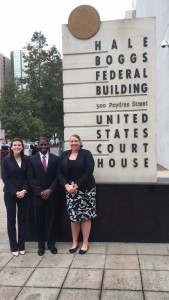A Cuban Perspective on International Law
As a member of the group of students and faculty who recently visited Cuba, I want to concur in all of the prior posts that expressed how fascinating it was to tour Havana, learn about some of the history, and in particular interact with the people. Prior to the trip, my only encounters with socialists had taken place in Berkeley, California and Eugene, Oregon, so I’d always associated the ideology with Left Coast stuff like patchouli and hemp shoulder bags. This was my first opportunity to meet and talk with genuine, born-and-raised socialists–people who think of Marx and Engels the way we might think of Locke or Smith. One of those people was Celeste Pino Canales, a professor of public international law at the University of Havana, who spoke with us about Cuban perspectives on international law and, afterward, allowed me to interview her on what it’s like to be a law professor in Cuba. A post about our conversation is available here.

